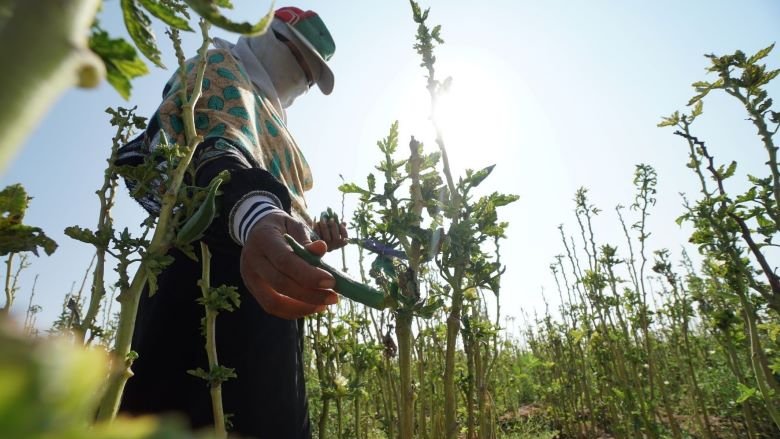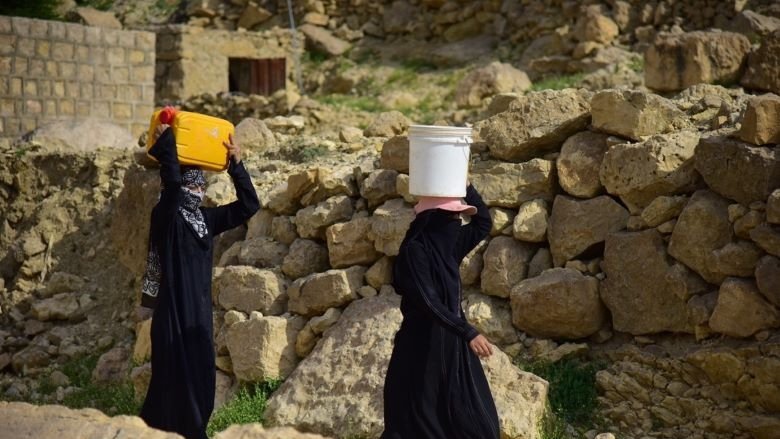After seven years of continuous armed conflict, rural communities of Yemen are growing more dependent on women, their grit, and resilience. As wages for other types of work have plummeted or dried out women are now often the sole breadwinners.
“I was brought up on the importance of working on the farm,” says Yasmine Saeed in Lahj governorate’s Bir Amer district in southern Yemen. “It has always been the family’s source of livelihood. On our farm, we grow onions, okra, watercress, and mallow. The money we make from selling crops covers our basic needs.” And, while Yasmine faces numerous challenges including the risk of injury while fetching water or harvesting crops, the alternative is more dire—the loss of food security and stability. This bleak prospect is what women typically face in rural Yemen.
Very little of Yemen’s staples, wheat and rice, are produced domestically. In 2016, a year after the conflict began, the amount of cultivated land decreased by an average 38%, compounding food scarcity. According to World Bank research on climate adaptation, almost two-thirds of Yemenis still rely on agriculture to make ends meet, and more than 75% live in rural areas, where women represent about 95% of the labor force.
In these rural societies, women play a pivotal role not only in food security but also land management and mitigation of the effects of climate change on water—which is already scarce. Despite the social pressures placed on them, as well as shouldering all the domestic chores, and the brunt of a global pandemic, Yemeni women have continued to work the land.
Yasmine was one of the seven women we spoke to, to hear how assistance from the International Development Association (IDA) is being used to help women farmers harness water from irrigation canals and spate irrigation (which diverts water from rivers in full spate), as well as water conservation and integrated watershed management techniques. The Bank funds Yemen’s Emergency Crisis Response Project (ERCP) through UNDP Yemen and key national institutions, namely the Social Fund for Development (SFD), and the Public Works Project (PWP). Both have ambitious plans for the future.
Climate-change adaptation key to food security
Like many women in her community, 60-year-old Katebah Sayyad takes care of her children—she has 12—as well as farming. “Agriculture and grazing animals are our main sources of income, especially since all salaries were cut off by the conflict,” she says. She grows corn, wheat, barley, fenugreek, and soqla, a type of barley. “However, rains come late and, when they do come, they are insufficient, causing a decline in crop yields,” Katebah says. ”My planting season has passed by without bringing in a harvest.”

Katebah says climate change has affected the agricultural season where she lives in Quhal in Iyal Surayh district of Amran governorate in northern Yemen. This has created even more hardship for her family.

Previously though, her hard work and dedication to her land and her family paid off. She was able to overcome numerous challenges and bring in a stable household income. “I am proud of myself,” she says. “I fought for my land, my home, and the education of my children. I worked hard and supported my children until their graduation from university. Now, I feel so content and happy when I look at the things I have achieved so far.”
In Al-Rabisah in the Ash Shamayatayn district of Taiz in southwestern Yemen, Rola Abdullah is a widowed mother of four and the sole breadwinner for her family. “I have been working in agriculture for more than 13 years, and it is our only source of income,” she says. “I grow tomatoes, cucumbers, chili peppers and other crops.”

Extreme weather, which many scientists attribute to an increase in the pace of climate change, has had a devastating impact on her farm, putting her family’s livelihood at risk. “Heavy downpours, strong winds, and thunderstorms have damaged my farm,” she explains. “Agricultural pests and insects have damaged the crops too. One year, due to climate change, I lost half of my harvest.”
With specialized advice, she was able to rehabilitate her land and resume working on it. “I now have a tarpaulin, a mesh protective net for crops, an electric generator, and a drip irrigation network,” Rola says. The extra support has led to improvements in crop yields and income.


The guidance Rola received on how to improve her land included training in farming techniques like “tending trees, fertilization methods, pesticide use and when to spray. This support helped me increase my overall agricultural production,” she says.
The contribution of rural women to farming, income, and food security cannot be overstated. Iqbal Al-Jubeiry is a 26-year-old woman who, like Yasmine Saeed, the first farmer, lives with her family (of six) in the village of Bir Amer in Tuban district, Lahj governorate in southern Yemen. Iqbal gets up with the first light to get herself ready for a long day.

Agriculture has helped me improve my family’s living conditions. In addition to farming and animal husbandry, I also sew women’s clothes and make henna to sell, which helps me build a better life for me and my family.”

However, the hard work takes its toll and rural women are vulnerable to poor health. “We women have to travel a great distance to fetch water. It is an arduous task that makes daily life more difficult, as well as putting us at risk,” says Iqbal, who mentions a pregnant woman who fell on her way to fetch water. “She had a miscarriage and lost her child.”
Nevertheless, Iqbal feels positive. “In spite of all that I am going through, I feel that I am a strong woman because I have undertaken a big responsibility: I have succeeded at work and created a sustainable life for my family,” she says.


